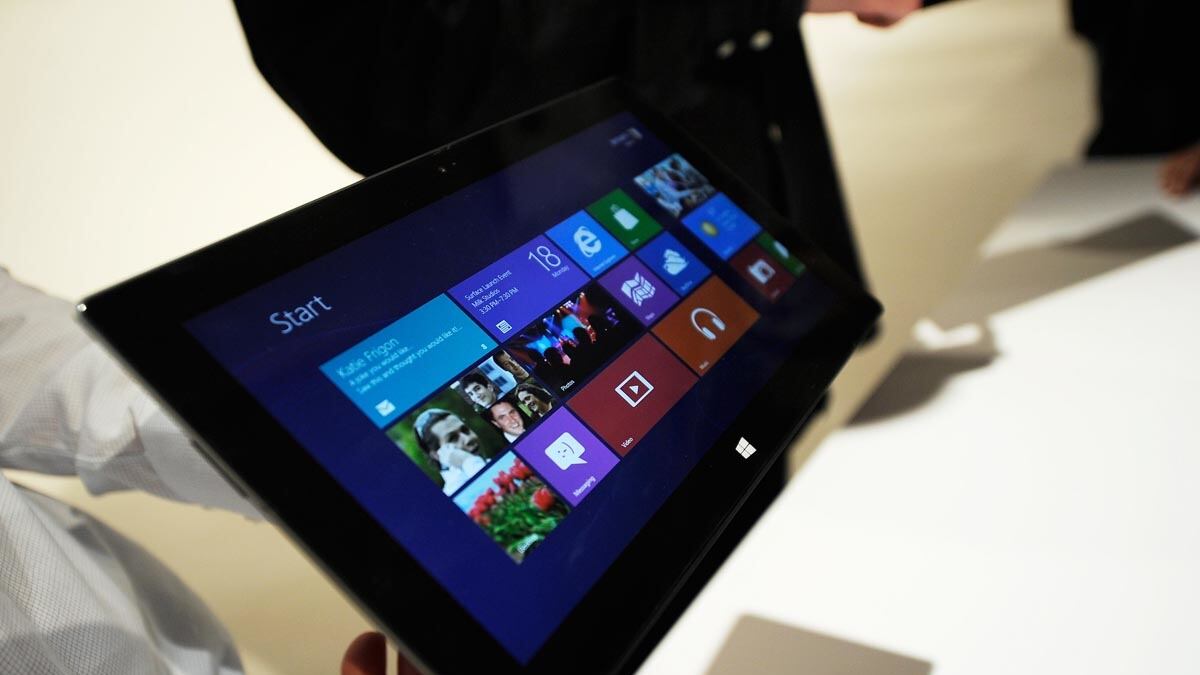Microsoft just introduced a cool little product called the Surface, a 10.6-inch tablet computer that weighs only 1.5 pounds and has a cover that doubles as a keyboard.
The company won’t say how much the Surface will cost or when it will ship, but you can probably expect to see it in stores for the holiday season.
The Surface is so sleek and cool—the case is made of “vapor-deposited magnesium”—that Gizmodo, a top gadget blog, declared that the Surface has rendered Apple’s MacBook Air and iPad obsolete.
But that’s not the important part. The real significance of the Surface is that it marks the end of an era, for Microsoft and for the industry at large.
See, this slick little tablet isn’t made by one of Microsoft’s PC-maker partners like Dell or Hewlett-Packard. Instead, the Surface is being made by Microsoft itself.
That’s huge, because it means Microsoft is now adopting the Apple business model, making both the operating software and the hardware.
It also reflects a big change taking place across the computer industry. The PC era, which began three decades ago, is giving way to what Apple’s late CEO Steve Jobs called “the post-PC era.”
The new era is all about mobile devices like smartphones and tablets. But it brings not only new gadgets but also a new business model.
In the old era, Microsoft stuck to making operating-system software, licensing Windows to scores of PC makers, which made the computers.

In the new era, three major players—Apple, Google, and Microsoft—will sell complete solutions, with four main elements: hardware, operating software, online store for selling apps and content (music, movies) for those devices, and a cloud service for storing content.
All three companies are already putting these pieces in place. Apple has the iPhone and iPad, the iOS operating system, the iTunes store, and iCloud. Microsoft has Windows, the Zune Marketplace online store, SkyDrive cloud storage, and now the Surface tablet. Google has Android, the Google Play online store, Google Drive cloud storage, and Nexus smartphones.
Of the three, Microsoft is taking the most risk. By getting into the hardware business, the software giant could alienate the PC makers that license Windows to use on their computers.
On the other hand, where are those PC makers going to go? Windows is the only real operating system they can use, at least for personal computers.
For tablets, those PC makers could turn to Google’s Android system, but guess what? When it comes to competing against its partners, Google is no better than Microsoft. That’s because Google just bought Motorola, one of its Android licensees, and presumably will start making its own smartphones and tablets.
Microsoft had no choice but to start making hardware. As Bloomberg Businessweek points out, Microsoft’s partners have had ample opportunity to come up with a tablet that can rival Apple’s products, and all they’ve made are “hapless, copycat products.”
Sure, during his rollout of the Surface, Microsoft CEO Steve Ballmer made an effort to say how much Microsoft still loves and values its hardware partners.
The hard truth is that Microsoft is leaving those guys behind. The harder truth is that many of them are doomed.
In this brave new mobile world, any company that doesn’t make its own operating system will have a hard time competing.
That’s why HP acquired Palm, which had a decent mobile operating system, WebOS. But WebOS couldn’t get any traction in the market.
That’s also why Samsung’s new CEO has been making noise about creating its own operating system and reducing its dependency on Google and Android.
This may seem hard to believe, but in five or 10 years, phone and PC makers that don’t create their own operating systems—even big names like Asus, Dell, Hewlett-Packard, HTC, and Lenovo—probably will be history. Nokia, which is betting its business on Windows Phone, will stay alive only if it can get acquired by Microsoft.
Of course Microsoft pays lip service to how much it treasures its hardware partners. For now it needs to keep them around so it can continue to generate revenue from PC sales while making the transition into the new era.
But in the long run, as far as Microsoft is concerned, the Microsoft-made Xbox and a few Microsoft-made tablets and smartphones (possibly created by a future acquisition of Nokia) will be the devices that matter the most.
If other companies want to use Microsoft software to make great mobile devices that tap into Microsoft’s online store and online cloud service, great. If not, that’s fine, too.
Similarly, as far as Google is concerned, products made by Motorola (read: Google) will be the only ones that matter.
In addition to the fight over smartphones and tablets, another even bigger battle is looming over the living room, which all three companies want to control.
Apple has had modest success with its Apple TV product, and now is rumored to be working on a TV set that will connect to Apple’s online store and cloud service. Google so far has floundered in the living room, with a half-baked product called Google TV that was a total flop.
But the clear leader in the living room is Microsoft. Its Xbox 360 has been wildly popular as a videogame console and now is evolving into more of a home-entertainment hub serving up movies, music and live TV, including sporting events.
Indeed, as I pointed out back in April, after spending a month using nothing but Microsoft products, the company is well-positioned to make a comeback, though many people have written it off as a has-been.
One big question was whether Microsoft could ever be cool again. The drop-dead gorgeous Surface tablet seems to answer that question. Who knew the clunky old dunces at Microsoft could produce something so lust-worthy? Who knew Microsoft even had designers on staff?
Well, it does, and lately they’ve been cranking out some really impressive products, from the award-winning Arc Touch mouse to the gorgeous tiled interface on Windows Phone and the radical (some love it, some hate it) Metro user interface on Windows 8.
I’ve been covering Microsoft for 25 years, and one thing I’ve learned is that the people inside this company are very smart and very good at adapting to change. They don’t always move quickly. But they are incredibly competitive and incredibly persistent. They will fail and fail and fail but still keep coming at you.
In recent years, many people, myself included, have written them off. That might have been a mistake.






